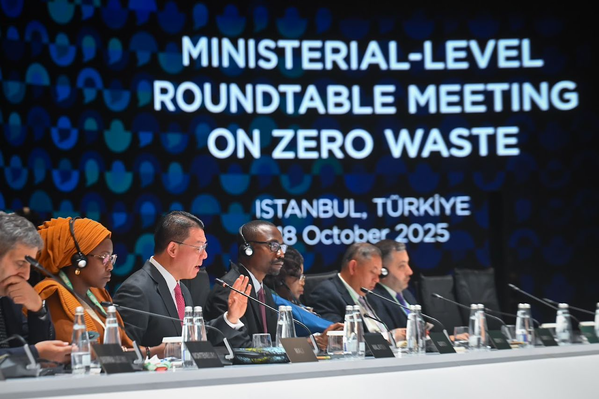Avoiding greenwashing culture in the sustainability journey

Ato Nimoh-Brema at Apogee Corporation explains that without a clear vision of sustainability, attempts by organisations to improve ESG credentials may be little more than a facade
Earth Day 2022 recently saw national and regional governments join forces with private and public sectors, major brands, and climate activists across the world to put the spotlight on environmental protection and raise awareness of more sustainable ways of living.
Capturing global headlines and a combination of positive and negative commentary, it was a clear sign that environmental, social and governance (ESG) factors are rising to the very top of the corporate agenda.
Widely recognised as both a moral and business imperative, sustainability has now become a key expectation for customers, as they increasingly look towards businesses to reflect their own values and lead the way in providing more environmentally friendly solutions.
Accordingly, businesses and suppliers are under pressure not only to act sustainably in their everyday operations, but to show their commitment to environmental and social impact goals.
But while most organisations aspire to be more sustainable, many lack a clear vision and struggle to put their ideals into practice. This can result in businesses ‘greenwashing’ their practices, overstating their environmental credentials to cover up shortcomings and gain competitive advantage.
Companies can make ‘green’ promises with the best of intentions. But if no transparent and meaningful progress is made towards these aspirations, they not only risk holding back the positive message of the sustainability movement but also stand to harm their own reputation and brand image.
As customers and employees become increasingly aware of greenwashing practices, those businesses failing to walk the walk and back up their claims with real action will struggle to make any progress on their sustainability journey.
It is vital that organisations take a pragmatic, realistic approach to reducing their environmental impact. But how can they develop and highlight the sustainable attributes of their business whilst avoiding the greenwashing trap?
The ‘green sheen’
Greenwashing refers to the act of portraying a business’s products or services as more environmentally friendly than they are. The term was coined in the 1980s to describe outlandish corporate sustainability claims. Nowadays the practice is less overt, more sophisticated, and increasingly widespread.
Businesses may make a big noise about one small green attribute on an otherwise unsustainable product, or use vague terminology or accolades, such as “eco-friendly” or “the greenest” Greenwashing can also be unintentional, often stemming from a lack of research or understanding of how to achieve true sustainability.
It is easy to understand why greenwashing occurs. 64% of consumers surveyed by Green Print say that they are happy to pay more for sustainable products, while 78% say they are more likely to buy products that are labelled as ‘environmentally friendly’.
As environmental and social issues climb up public and political agendas, customers are actively seeking out more sustainable products and services from companies with strong environmental credentials.
For businesses eager to climb aboard the sustainability train, it may seem all too easy to sugar-coat or embellish their own environmental claims in order to put their best foot forward and tell a good story. Therefore, a false impression of excellence is created without having any credible impact on the things that matter.
Effects of greenwashing
No matter what the intention behind greenwashing is, such practices often harm both a business’s reputation and the wider message on sustainability. Any veneer of positive environmental or social impact can conceal damaging actions going on in the background or distract from the most pressing issues.
Furthermore, fear of being accused of greenwashing could hinder businesses from promoting their own sustainable practices in future. By diluting the overall meaning of the sustainability journey – not to mention the credibility of other businesses making genuinely progressive steps – corporate greenwashing serves to undermine the positive impact of the sustainability movement.
Greenwashing can also hurt businesses themselves. At a time when employees and consumers alike are increasingly cynical about the environmental claims made by corporations, misleading messages can significantly damage confidence, loyalty, and trust in an organisation.
Recent whistleblowing cases around corporate greenwashing further underline the reputational risks of overstating a company’s response to climate change.
It is no longer enough to pay lip service to environmental and social goals – businesses must now ensure their claims are clear, relevant and reliable, backed up with credible and up-to-date data.
Actions, not words: how to avoid greenwashing
So, how should businesses embark on and communicate their sustainability journey with integrity and confidence?
Any truly effective change must start with the leadership team. Without the commitment of senior stakeholders, any business will find it difficult to commit the budget and resources needed to make transformational changes that have a lasting impact.
Therefore, sustainability aims must clearly align with the overall vision of the business. A simple, clear, and regularly communicated message will resonate with the entire corporate workforce, the wider supply chain, and other stakeholders.
It is also vital to set sustainability goals that are relevant to the value chain, rather than taking shortcuts or following the herd. While recycling more plastic or planting trees in faraway places are well-intentioned acts, they may not hold any particular meaning or value for stakeholders, rendering them rather shallow.
Instead of following the ‘flavour of the month’, businesses should undertake an independent materiality assessment to better understand the key ESG themes and topics that resonate with their stakeholders.
This will involve a series of internal interviews to gather evidence on what truly matters to employees, customers, suppliers and other stakeholders, and their expectations of the organisation. Therefore, companies can more effectively prioritise their objectives, enabling them to set aside budgets, create specific targets, and ensure that all-important buy-in from senior stakeholders.
An organisation that is truly committed to its sustainability journey will undertake regular reports and reviews to measure progress. Sometimes, a target will fail to be met on time – and that’s nothing to fear. In fact, the process of acknowledging where progress has fallen short - and why - can uncover valuable insights and learnings that help to drive a business further along its journey.
Feedback to the board will also ensure that decision makers are made aware of which projects are on track and whether more support is needed.
Businesses must also work towards overcoming the data challenges that have long been a barrier to progress. Many organisations do not have the in-house expertise to gain the robust data insights needed to take credible action on sustainability. This can result in them setting a baseline that ensures ‘easy wins’, rather than one that stretches and challenges them to do more to reduce their environmental impact.
A lack of clear data also creates room for manipulation, making it all too tempting to spin the figures to generate a particular outcome. This will not end well for businesses.
To avoid this greenwashing trap, companies should consider outsourcing their data to a specialist partner, which will enable them to gain a true picture of their impacts and opportunities.
Accordingly, businesses will be able to establish a strong baseline and work towards a clear plan, building credibility into their reports by ensuring that all data is independently verified, and industry standards are followed.
Transparency and trust
For any business wishing to be more sustainable without unintentionally greenwashing, transparency is key. When a target has not been met, it always pays to be honest with stakeholders and customers. Share insights into why the plan didn’t work, the lessons learned, and what will be done differently in future.
At a time when people are more alert to greenwashing and half-truths than ever before, this approach is likely to strengthen confidence and trust.
Transparency not only allows businesses to promote their sustainability journey, but it also pushes others to do the same.
Ato Nimoh-Brema is Head of Sustainability and Business Assurance at Apogee Corporation which aims to be a zero-waste organisation by 2030. This ambitious goal is supported by a clear roadmap, commitment from the senior leadership team, and a thorough materiality assessment. Apogee regularly shares best practice and encourages collaborative partnerships across industries.
Main image courtesy of iStockPhoto.com

Business Reporter Team
Most Viewed
Winston House, 3rd Floor, Units 306-309, 2-4 Dollis Park, London, N3 1HF
23-29 Hendon Lane, London, N3 1RT
020 8349 4363
© 2025, Lyonsdown Limited. Business Reporter® is a registered trademark of Lyonsdown Ltd. VAT registration number: 830519543





